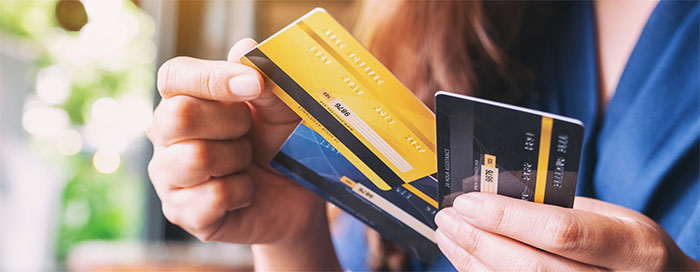Debit Card vs. Credit Card
Will that be "debit or credit?" While you may hear this question several times a day, have you ever thought about what separates these two payment methods?
Most people are probably aware of the primary difference between credit and debit cards. A debit card immediately withdraws funds directly from your bank account, where as a credit card charges purchases to a line of credit that can be paid off at a later date.
Sounds simple, right? There is actually more to it than that. In fact, there are considerable advantages and disadvantages to using debit or credit cards, depending on the situation. Below are some important considerations to keep in mind for the next time you're deciding on which type of card to use.
Debit Cards
One of the primary advantages of a debit card is knowing that you're only spending funds you currently have, which can help reduce the chances that you overdraw your account.
Since money is instantly removed from your account when you use a debit card, you have to be mindful of checks that have not cleared your account and automatic drafts/scheduled payments. You'll want to be sure you maintain enough money in your account to cover these items as well.
Another benefit of debit cards is that it costs less to make a transaction compared to a credit card, because debit cards pull funds directly from your account. Small businesses, especially mom-and-pop shops, prefer customers use debit cards, because it spares their bottom line from the higher costs associated with credit card transactions.
Credit Cards
Perhaps the biggest benefit of a credit card is in the area of fraud and identify protection. If fraudulent activity occurs through a credit card, your funds are not at risk as with a debit card. Under the Fair Credit Billing Act, consumers have 60 days from the time they receive their statements to dispute any fraudulent charge over $50.
With risk in mind, there are several other situations where using a credit card is advantageous.
For instance, gas pump keypads are notorious for being compromised by illegal card readers, better known as "skimmers," that steal your personal data from your card. You may not know your information has been covertly stolen until days after it's happened, so it's wise to use credit when paying at the pump.
Online sales and large payments are another area where credit cards can be beneficial. With internet scams and information phishing attempts on the rise, using a credit card can prevent criminals from obtaining direct access to your bank account. And, should anything go wrong, it will be easier to dispute the charges.
In addition to lower risks, most credit cards offer some type of rewards program. A few of the most popular programs are: real-time discounts on purchases, cash-back deals and travel reward points. While these offerings are undeniably attractive, consumers should be aware that credit card programs may charge higher interest rates on unpaid balances, which can quickly negate the benefits of reward programs.
Both debit and credit cards are convenient financial tools that give you reliable access to funds without the need to carry large amounts of cash. Having one of each, and knowing when to use them, is one of the keys to financial success.

